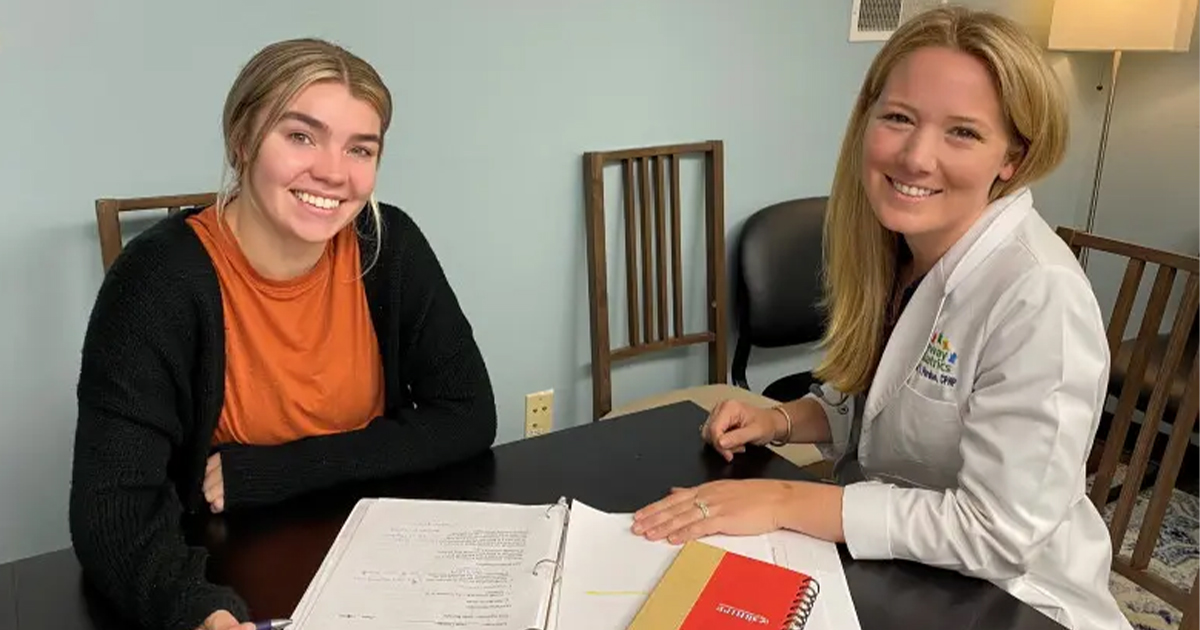SU's BHIPP Program Celebrates Decade of Success and 9,000 Contact Hours Milestone
SALISBURY, MD---Salisbury University’s Behavioral Health Integration in Pediatric Primary Care (BHIPP) Program recently celebrated a decade of success and a milestone of 9,000 contact hours.
“I am so proud of the students, faculty and staff that have contributed to the BHIPP Program,” said Rachel Moore, director of SU’s Center for Healthy Communities. “For 10 years, this program has provided much-needed additional mental health services in our community. As we cross the 9,000-contact-hour threshold, I look forward to our continued success, providing and supporting our community in this most meaningful way.”
BHIPP is a collaboration between SU’s Center for Healthy Communities, the University of Maryland School of Medicine, the Johns Hopkins University School of Medicine and Morgan State University, with funding from the Maryland Department of Health’s Behavioral Health Administration. Salisbury’s component of this collaboration is to train, place and supervise master’s-level social work interns in pediatric primary care offices throughout the state.
“These collaborations are mutually beneficial and equally important for both students and the practices they serve,” said Jan McIntyre, LCSW-C and BHIPP program manager. “Interns are able to not only receive real-world clinical experience with their patients, but are able to learn independence in decision making while simultaneously working in a partnership with medical professionals.”
McIntyre places 8-11 M.S.W. interns in the Specialized Practice in Clinical Social Work and Advocacy Year across eight practices in nine locations throughout rural areas of the state.
For M.S.W. student and BHIPP intern Lexie Thomas, of Seaford, DE, the experience has affirmed her love of clinical social work.
“If you want a real clinical experience and know that you’re passionate about the work, BHIPP is the ideal internship,” she said. “You get that direct supervision while balancing independent and collaborative processes. With so many trainings, licensure preparation opportunities and resources available, BHIPP is preparing you to be the best professional you can be.”
Patient ages span from birth, including maternal mental health care, to young adults. Students cover cases encompassing all aspects of clinical social work, including ADHD, anxiety and depression.
“My patients range from 3-17, which makes no one treatment plan look the same,” said Thomas. “What you would do for a young toddler is completely different than how you would work with a teenager. This makes the experience challenging in a very rewarding way. I’m able to work through several scenarios and cases that only prepare me more for the future.”
When determining which students are a good fit for BHIPP, McIntyre looks for professionalism, undergraduate clinical experience, and a passion for mental and behavioral health that can grow throughout the students’ placements.
“I always enjoy witnessing the reactions when the students look back on their written reflections throughout the semester and year as they recognize their own growth,” she said. “They are able to see how much their level of knowledge has grown, their weaknesses improved and, overall, how confident they are in their own abilities at the end compared to when they started. They are able to prove to themselves just how prepared and qualified they are for their future careers.”
The experiential learning that BHIPP provides allows more mental health and clinical resources to be spread across the state, especially in areas and practices where mental health care is limited.
“I am one of the first interactions with a mental health professional for most of my patients,” said Thomas. “To see the work that they put in at the end of our sessions is very rewarding. I always strive to provide them with a positive experience so it’s less scary to go somewhere else for help in the future when they are older and hopefully bridge that mental health gap, even for their parents who may not have had experience with this type of care. I truly can say it feels like I’m making a difference in the lives of others.”
For more information visit the BHIPP program website and the Center for Healthy Communities webpage.
Learn more about SU and opportunities to Make Tomorrow Yours at www.salisbury.edu.

